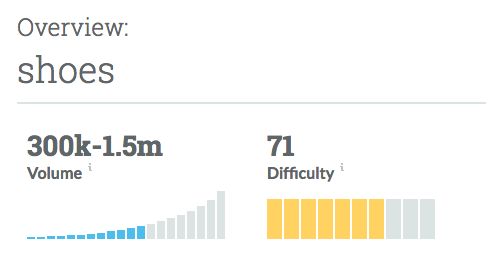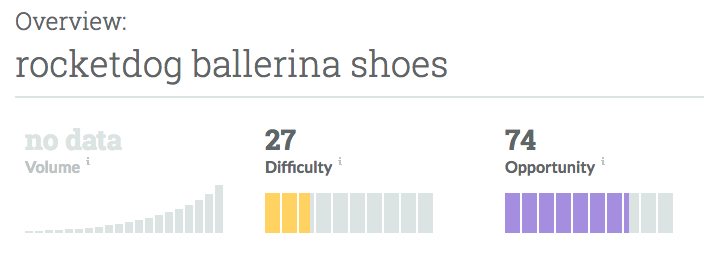How to Use Long Tail Keywords Properly

We’ve heard it all. Long tail. Short tail. Phrases. Keywords. But we kept our cool and we’ve got it all under control. If you’ve been waiting for a definitive guide on all things long tail and all things keyword, look no further. We’ve got your tail covered.
Let’s break it down in some laymen’s terms. Because we hate marketing jargon. A long tail keyword is not something you pin on the donkey. It’s not something you wear on the back of your head. And it’s not something you should be scared of. All it is is a longer search term that you can use to reach customers. So what does that mean exactly?
When you search for something online, sometimes you use single keywords. Like “shoes.” But more often than not, you want something specific, right? You want pink ballet shoes from Rocketdog like the ones you had in high school. Cool. So you probably search a variety of long tail keywords (aka phrases). You might look up “Rocketdog ballet shoes” or “pink ballet shoes” or even “Pink Rocketdog ballet shoes” or perhaps” Pink Rocketdog ballet shoes 2006.” You’ll probably get a bunch of cool information that meets your needs. Or, if there aren’t any Rocketdog ballet shoes from 2006 floating around online, you might find some other cool, more recent Rocketdog ballet shoes.
What’s the point?
So now that we know what it is, we need to talk about why the heck someone would use a long tail keyword. It’s pretty straightforward. Long tail keywords are more specific, so you can reach more people. And, not only that, but you can reach people who are looking for your exact product. The trick is to make sure your long tail keyword appears in your metadata and on the page you’re hoping to rank for. According to Yoast, an SEO marketing and educational company, “The longer and more specific the search terms are, the higher the chances of conversion are (Yoast).
Now you don’t have to go crazy and write weirdly specific keywords like “size 8 camo ballet shoes for little princesses” or something, but you should use longer keywords whenever you’re coming up with a marketing strategy. When you are looking for a design studio in Wichita, for example, you might type in “Wichita website design,” (or if you’re really in a hurry, “wichita website design” (no caps).You wouldn’t usually type in something generic like “web design,” but you might. More likely than not, you’ll look for something specific — either based on local results or based on some specific element that you need, like “reasonably priced website design,” or something. Google (or whatever search engine you’re using) will do the work to find relevant search results.
That’s why you want to include longer keywords. The more focused you can be, the more likely you’ll show up when people search for specific words. Long tail keywords are used everywhere. On home pages, landing pages, and even blogs. You can pretty much use a long tail keyword in any place that you’d use a regular one. There’s no hard-and-fast rule about when you should use a long tail keyword vs. when you should use a single keyword, so it’s best to use your judgement and make sure that you only use the keywords when they’re actually relevant. Don’t put “website design wichita” on a page that talks about stationery design.
Let’s look at a real-world example using Moz’s keyword tool:

Something like “shoes,” get a ton of searches, but there’s also a ton of competition. Something more specific, like “rocketdog ballerina shoes,” has much less difficulty, which means larger opportunity. And we all know what that means: more chances of getting discovered.
So now that we know why it’s better to use long tail keywords, let’s talk a bit about how to find the perfect keywords.
Cool Programs We Like
Moz Keyword Explorer – This is cool because it lets us search for keywords and check out the competition. The goal is to find keywords that have low competition and high search volume. Moz makes it pretty easy to find the best keywords, and it’s pretty much the first step in any keyword plan.
Answer the Public – Answer the Public lets you see what people are searching for. We like this tool because it lets us get some ideas for keywords that we probably wouldn’t have thought of.
Hittail – Hittail is cool because they analyze your website and provide personalized keywords to match your goals. You can try this one out for free, which is awesome, and we even got some cool keyword ideas for our own site.
Google Trends – This lets you see the trends near you and discover what people are searching for. To get the most out of Google Trends, type in the search term or category and Google Trends will show you the region where people usually search for. Look for related queries.
Microsoft Bing Ads Intelligence – This makes it easy to expand upon your keyword list while integrating it with Excel. We think this is cool because it makes it easy for us to organize and export our lists.
Wordtracker’s Free Basic Keyword Demand – Wordtracker is pretty much exactly what it sounds like– you can find and track keywords based on performance. Unfortunately, you can only use it for a certain amount of time for free, but it’s great while it lasts.
What Happens if We Don’t Use Long Tail Keywords
Well, that’s sort of a two-fold question. Nothing really happens. What we mean is, nothing good really happens. Long tail keywords make it easier for people who want to find you to find you. It’s pretty much all it’s used for. It allows someone to look for something specific and find exactly what they need. Without long tail keywords, customers will have to look a little harder to find your products or service.
Searches are only getting more specific. You can now search for stuff with Siri; you can ask questions and Google will track and respond based on your previous searches. You can link up questions. You can search and find specific answers easier. Search engines are evolving, so it’s a good idea to stay up to date with some important movements.
Beware of the Overly Specific
Okay, we feel sort of rude right now. We just talked about all the reasons you should use long tail keywords, but we don’t want to frighten you into becoming overly specific. Let us explain. Like we said, long tail keywords are cool. And if you can find the keywords that people are actually searching for, that will help your rankings. But don’t get too weird. If you’re selling textbooks, don’t use seriously specific keywords. Say things like “The 16th Edition of The Chicago Manual of Style for sale.” Don’t say, “Check out this book, which has an orange cover with gold embellishment – The Chicago Manual of Style – full of grammar tips about the Oxford comma, the dreaded comma splice, and anecdotal grammar information for you!” That’s not a phrase. That’s a freaking monstrosity.
When in doubt, use common sense (along with the tools above) to find the best long tail keywords for each page.